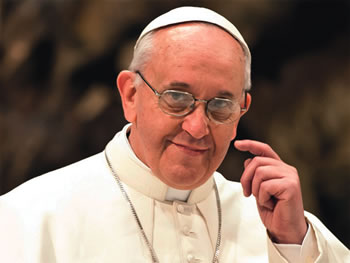On Mary, Tenderness and Poverty
 Learning from Mary to keep the Word of God
Learning from Mary to keep the Word of God
Keeping the Word of God: what does this mean? Do I receive the Word, and then take a bottle and put the word into the bottle and keep it there? No. Keeping the Word of God means that our heart opens, it is open to that Word just like the earth opens to receive the seed. The Word of God is a seed and is sown. And Jesus told us what happens with the seeds: some fall along the path, and the birds come and eat them; this Word is not kept, these hearts do not know how to receive it.
Others, he said, fall into a stony soil and the seed dies. Jesus says that they ‘do not know how to keep the Word of God because they are not constant: when a tribulation comes they forget.’ The Word of God can often fall into a soil that is unprepared, unkept, full of thorns. What are the thorns? Jesus pointed them out when He spoke of ‘attachment to riches, vices’. Keeping the Word of God means constantly meditating on what this Word says to us and what happens in our life. And this is what Mary did, she pondered and assimilated it. This is a truly great spiritual work.
Memory safeguards God’s Word. It helps us to preserve it, to remember everything the Lord has done in my life. It reminds us of all the wonders of salvation in His people and in my heart. Memory safeguards the Word of God. Think about how to keep the Word of God in your hearts, how to safeguard this astonishment, so that it is not eaten by the birds, suffocated by vices.
We would do well to ask ourselves: ‘With the things that happen in life, I ask myself the question: what is the Lord saying to me with His Word, right now?’ This is called keeping the Word of God, because the Word of God is precisely the message that the Lord gives us in every moment. Let us safeguard it with this: safeguard it with our memory. And safeguard it with our hope. We ask the Lord for the grace to receive the Word of God and keep it.
Source: News.va, homily of 8 June 2013
The science of tenderness
The Lord [knows] that beautiful science of caresses, the tenderness of God. He does not love us with words. He comes close—closeness—and gives us His love with tenderness. Closeness and tenderness! The Lord loves us in these two ways, He draws near and gives all His love even in the smallest things: with tenderness. And this is a powerful love, because closeness and tenderness reveal the strength of God’s love.
It is more difficult to let God love us, than to love Him! The best way to love Him in return is to open our hearts and let Him love us. Let Him draw close to us and feel Him close to us. This is really very difficult: letting ourselves be loved by Him. And that is perhaps what we need to ask today in the Mass: ‘Lord, I want to love You, but teach me the difficult science, the difficult habit of letting myself be loved by You, to feel You close and feel Your tenderness!’ May the Lord give us this grace.
Source: The Catholic World Report, homily of 7 June 2013
The scandal of poverty
In a world where there is so much wealth, so many resources to feed everyone, it is unfathomable that there are so many hungry children, that there are so many children without an education, so many poor persons. Poverty today is a cry. We all have to think if we can become a little poorer, all of us have to do this. How can I become a little poorer in order to be more like Jesus, who was the poor Teacher?
First of all I want to tell you something, tell all you young persons: don’t let yourselves be robbed of hope. Please, don’t let it be stolen from you. The worldly spirit, wealth, the spirit of vanity, arrogance, and pride … all these things steal hope. Where do I find hope? In the poor Jesus, Jesus who made himself poor for us.
Look, you can’t speak of poverty without having experience with the poor. You can’t speak of poverty in the abstract: that doesn’t exist. Poverty is the flesh of the poor Jesus, in that child who is hungry, in the one who is sick, in those unjust social structures. Go forward; look there upon the flesh of Jesus. But don’t let well being rob you of hope, that spirit of well being that, in the end, leads you to becoming a nothing in life. Young persons should bet on their high ideals, that’s my advice. But where do I find hope? In the flesh of Jesus who suffers and in true poverty. There is a connection between the two.
Source: Vassallomata, 10 June 2013
 Entries(RSS)
Entries(RSS)